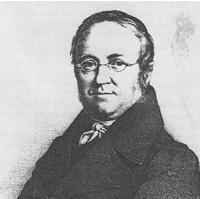Planning worship?
Check out our sister site, ZeteoSearch.org,
for 20+ additional resources related to your search.
- |
User Links
Person Results
Karl August Döring
1783 - 1844 Person Name: K. A. Döring Author of "Mein Trost in Zweifelsnächten ist" in Evangelisches Gesangbuch mit vierstimmigen Melodien Döring, Carl August, son of B. L. Döring, chief forester at Mark-Alvensleben, near Magdeburg, was born at Mark-Alvensleben, Jan. 22, 1783. After completing his studies at the University of Halle, he was for some time private tutor at Waldenburg, in Silesia. In 1808 he was appointed a master in the school at Kloster-Bergen, near Magdeburg; and after its dissolution by Napoleon in 1810, acted for some time as a private tutor at Helmsdorf, near Eisleben. He was, in 1814, appointed afternoon preacher at St. Peter's Church, Magdeburg; in 1815 Archidiaconus of St. Andrew's Church at Eisleben; and in 1816 Pastor of the Lutheran Church at Elberfeld. He died at Elberfeld, Jan 17, 1844 (Koch, vii. 159-168; Allg. Deutsche Biog. , v. 348-349).
One of the most prolific of German hymnwriters, he produced some 1200 hymns, not a few of which have passed into use in Germany through the Berlin Gesang-Buchem, 1829, the Nassau Gesang-Buch, 1844, and other collections. They appeared mostly in his Christliches Hausgesangbuch. Of this pt. i was published at Elberfeld, 1821, with 515 hymns by himself, and 169 by others; the 2nd edition, Elberfeld, 1825, omitting those by other authors, and increasing his own to 630. Part ii was published at Elberfeld, 1830, with 551 hymns. Three have been translated:—
i. Ich weiss, dass mein Erlöser lebt, Er ward ja schon mein Leben! [Easter.] 1821, as above, No. 100, in 6 stansas, translated as “I know that my Redeemer lives; He is my life already," by N. L. Frothingham, 1870, p. 157.
ii. Vater, Sohn and heil'ger Geist. [Confirmation.] 1821, as above (No. 546), as a hymn for Confirmation. It is in 15 stanzas of various metres, st. i.-iii. being marked as to be sung by the congregation on behalf of the children; stanzas viii.-xiii. as a hymn of supplication by the children; stanzas iv.-vii. by the parents and teachers; and stanzas xiv.-xv., by the congregation as a general supplication. Two parts are in German common use, viz. stanzas i.-iii. as Rin Bunsen's Versuch, 1833, No. 614, beginning, "Segne, Vater, Sohn und Geist," as in Döring's edition 1825, No. 502; and stanzas viii.-xiii., beginning, "Wir flehn um deine Gnade," in Bunsen, No. 615, the Hamburg Gesang-Buch, 1842, No. 276, and many recent collections. The only translation in common use is—
Father, Son and Holy Ghost, Bless the Young. A good translation of stanzas i.-iii. by J. S. Stallybrass, in the Tonic Sol-fa Reporter, January, 1859, and thence, as No. 329, in the Scottish Presbyterian Hymnal, 1876.
iii. Taufe mich mit deiner Taufe, [Whitsuntide.] 1821, as above, No. 135, in 4 stanzas. It is translated as "With other baptism, Lord, baptise," by Dr. G. Walker, 1860, p. 66. [Rev. James Mearns, M.A.]
-- John Julian, Dictionary of Hymnology (1907)
Karl August Döring
Johann Georg Frech

1790 - 1864 Person Name: Frech Composer of "[O süßes Wort das Jesus spricht]" in Evangelisches Gesangbuch mit vierstimmigen Melodien Johann Georg Frech (* January 17 1790 in Kaltental, † August 23 1864 in Esslingen am Neckar ) was a German music director, composer and organist.
Naughty was the son of a watchmaker and organ builder. He visited here until his 13th Age of the school, then high school in Stuttgart and took lessons in music.
In 1806 he was teaching assistant in Degerloch while still in Stuttgart, studied music. In 1811 he went as a teaching assistant after Esslingen and in 1812 a music teacher at the newly established Esslinger teacher seminar. In 1820 he received the office of a municipal director of music and organist at the main church in Esslingen, where he remained until his retirement in 1860. His successor was Christian Fink.
Naughty took a significant role in the Württemberg church singing together with Konrad Kocher and Friedrich Silcherstraße one. Together with the aforementioned He created "The Württemberg Choral Book" of 1828 and was co-editor of "Württemberg Choral Book" of 1844.
Frech has composed six symphonies, many choral works, including 22 chorales for Württembergischen chorale books, 67 cantatas, an opera, the oratorio "Abraham on Moriah" and some organ works.
In the district of Stuttgart Kaltental a street was named after naughty.
--de.wikipedia.org/wiki/
Johann Georg Frech
Johann Hoefel
1600 - 1683 Person Name: J. Höfel Author of "O süßes Wort das Jesus spricht" in Evangelisches Gesangbuch mit vierstimmigen Melodien Höfel, Johann, was born June 24, 1600, at Uffenheim, in Franconia, and studied at the Universities of Giessen, Jena, and Strassburg, becoming in 1628 Doctor of Law at Jena. In 1633 he settled in Schweinfurt as a consulting lawyer, and died there Dec. 8, 1683 (Wetzel, i. 435-436, and A. H. ii., 285-291). One of his hymns has been translated into English:—
0 süsses Wort das Jesus spricht . Cross and Consolation . Founded on St. Luke vii. 13. Included as No. 461 in the Coburg Gesang-Buch, 1655 [Göttingen University Library], in 11 stanzas of 4 lines, entitled, "The sweet saying of Jesus, ’Weep not,' Luke vii." According to Koch , iii. 141, it had previously appeared in his Musica Christiana, 1634. Translated as "Oh, sweetest words that Jesus could have sought," by Mrs. Findlater, in Hymns from the Land of Luther 1855, p. 8 (1884, p. 75). (Rev. James Mearns, M.A.]
-- John Julian, Dictionary of Hymnology
Johann Hoefel


 My Starred Hymns
My Starred Hymns


